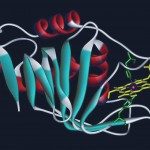Lien vers Pubmed [PMID] – 20181617
Biol. Reprod. 2010 Jun;82(6):1170-9
Previous in vivo studies have established that pituitary nitric oxide synthase type 1 (NOS1) is regulated by gonadotropin-releasing hormone (GnRH). The aim of our study was to elucidate the mechanisms of NOS1 regulation by GnRH in rat pituitary cells. Using a perifused cell system, we demonstrated that NOS1 induction was sensitive to GnRH pulse frequency and was maximally induced under continuous GnRH stimulation. In primary cultures of rat pituitary cells, sustained stimulation with the GnRH agonist triptorelin (GnRHa) increased NOS1 protein levels, whereas NOS2 and NOS3 levels were unaffected. NOS1 up-regulation occurred in gonadotroph cells only, in a time-dependent and concentration-dependent manner (maximum increase, 2.5-fold; half-maximal concentration, 0.17 nM). GnRHa effect was mimicked by cAMP pathway activators and, most importantly, was blocked by disruption of the protein kinase A (PKA) pathway using pharmacological inhibitors such as Rp-cAMP or drug phosphatase technology-protein kinase inhibitor (DPT-PKI), a cell-permeant PKI peptide. In contrast, modulation of the PKC pathway and inhibition of the MAPK cascade were ineffective. Overall, these experiments demonstrated that GnRH-induced up-regulation of pituitary NOS1 is mediated notably by the cAMP/PKA pathway. Last, in vivo administration of a GnRH antagonist markedly inhibited the pituitary cAMP rise at proestrus in addition to suppressing NOS1 increase. Altogether, our data suggest that the cAMP/PKA signaling pathway is preferentially recruited under sustained GnRH stimulation in vivo during proestrus, allowing the expression of a specific set of PKA-regulated proteins, including NOS1, in gonadotroph cells.

